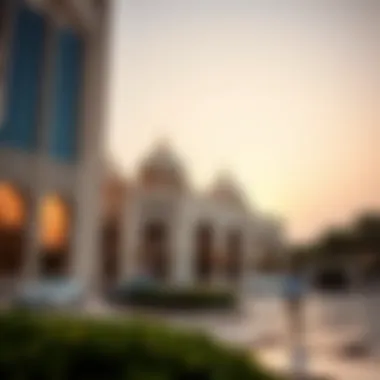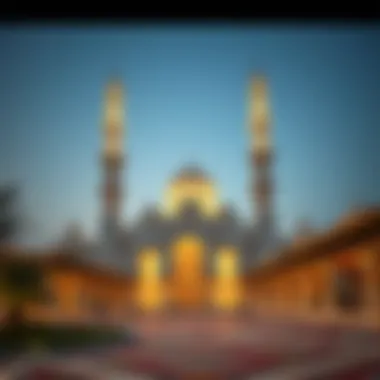Understanding the Ramadan Calendar in Dubai


Intro
Ramadan, a month revered by Muslims worldwide, holds distinctive importance in Dubai, a city characterized by its cultural diversity and economic vigor. This city is more than just a blend of modern skyscrapers and bustling markets; it embodies the cultural heart of the UAE during this sacred time. The significance of the Ramadan calendar reaches beyond personal devotion; it influences daily rhythms, from work schedules to social engagements, creating a unique atmosphere that resonates throughout the emirate.
As one dives into this guide, it becomes clear that understanding the nuances of the Ramadan calendar in Dubai entails a broader look at its implications on local customs, lifestyle, and even the booming property sector. The month-long observance not only marks a time for spiritual reflection but also delineates specific patterns that affect everything from public services to investment strategies in the real estate market.
With this context set, let’s peel back the layers and delve deeper into the interplay of Ramadan's observances with the cultural fabric and economic opportunities in Dubai.
The Essence of Ramadan
Ramadan is more than just a month; it's a profound pillar of faith for Muslims around the globe. In Dubai, this period resonates deeply, combining spiritual significance with social customs that revitalize the community. During this time, the city transforms into an emblem of reflection and unity, highlighting the essence of empathy and generosity. Understanding Ramadan is crucial for anyone living in or investing in Dubai, as it intertwines with cultural practices and influences various dimensions of daily life.
Cultural and Religious Significance
The observance of Ramadan symbolizes a time of spiritual cleansing and growth, as believers engage in self-reflection through fasting from dawn until dusk. This sacred month encourages increased devotion, with many choosing to spend additional moments praying, reading the Qur'an, and participating in charitable activities. The cultural tapestry of Dubai is enriched by these observances, as diverse communities come together in shared rituals.
Fasting during Ramadan is not merely about abstaining from food and drink. It serves as a reminder for many to appreciate what they have, develop self-discipline, and foster a sense of connection with those who are less fortunate. The act of fasting can feel arduous at times, yet the spiritual reward promotes a greater societal bond, reinforcing the moral fabric of the community in Dubai.
In the bustling Emirate, this month enhances the cultural vibrancy, as markets overflow with special treats and traditional dishes. Streets are adorned with lights, creating an inviting atmosphere that beckons all residents, Muslim and non-Muslim alike, to engage in shared experiences, whether it's at communal iftar meals or festive events.
Understanding Fasting Practices
Fasting, or sawm, during Ramadan is both a personal and communal practice. The fast begins just before sunrise, and many partake in a meal called suhoor to sustain themselves throughout the day. The breaking of the fast, known as iftar, is often celebrated with family and friends, signifying not just the end of the daily fast, but also a gathering that fosters togetherness.
The rules surrounding fasting can vary among individuals. While healthy adults are expected to observe the fast, exemptions are made for those who are unwell, traveling, or facing other hardships. In Dubai, a city filled with expatriates from varied backgrounds, it's essential for non-Muslims to approach these practices with respect and understanding. Many expatriates have embraced the spirit of Ramadan by participating in community meals or volunteering at various gatherings, thereby blurring cultural lines.
In summary, the essence of Ramadan in Dubai encapsulates cultural richness and religious devotion. It fosters a unique environment that embraces compassion, community, and understanding—all essential considerations for those looking to immerse themselves in the lifestyle of this vibrant city.
"Ramadan is not just a month of fasting; it’s a time for recommitting to spiritual values, a period to strengthen communal bonds, and a moment to reflect on one’s place in the world."
This underscores the importance of Ramadan, not only for individuals but also for the broader society that thrives on cooperation and unity.
The Ramadan Calendar Explained
The Ramadan calendar serves as a pivotal guide for millions observing this month across the globe and especially in Dubai, a city rich in cultural diversity. Understanding its nuances not only enriches one's appreciation for this holy time but also impacts various aspects of daily life and the economy, particularly in real estate. The overlapping of the lunar year with traditional business practices makes it essential to recognize how time is structured during this period.
Lunar Months and Their Implications
Ramadan is determined through the lunar calendar, relying heavily on the sighting of the moon. This means it does not have fixed dates on the Gregorian calendar. Depending on the moon sighting, Ramadan can start a day earlier or later, making it critical for those who follow it closely. The lunar cycles last about 29 to 30 days, depending on when the new moon is visible.
Here are some implications of this lunar structure:
- Economic Adjustments: Businesses often prepare in advance for the unpredictability of Ramadan's start. Knowing when it might begin helps retailers plan for increased demand in food and other supplies, especially for Iftar meals.
- Scheduling: For investors, understanding the lunar timing aids in planning significant purchases or commitments. Given the unique dynamics of Ramadan, property showings or major negotiations might be best scheduled before the month begins.
- Cultural Sensitivity: Real estate professionals must be aware that locals may have altered schedules during this period, leading to potential lags in business deals or decisions. Understanding Ramadan’s timing fosters better relationships with clients.
“The significance of lunar months goes beyond mere timing; it shapes the rhythm of life itself during Ramadan.”
Being aware of these factors helps individuals operate more effectively within the unique framework of Ramadan.


Key Dates and Observances
Key dates during Ramadan not only mark significant religious observances but also guide the social calendar in Dubai. Here are some notable dates:
- Start of Ramadan: The month begins with a new moon sighting. It's a time filled with excitement yet uncertainty, as people eagerly await the official announcement.
- Laylat al-Qadr (Night of Decree): This night is believed to fall within the last ten days of Ramadan and is designated for prayer and reflection. It is paramount for spiritual growth.
- Iftar: Every day during Ramadan, Muslims break their fast at sunset. This moment becomes vital for community bonding, and gatherings are common.
- Eid al-Fitr: Marking the end of Ramadan, this celebratory day involves communal prayers and feasts, showcasing the culture's warmth and hospitality.
These dates are more than just days on a calendar; they are moments that encourage reflection, community bonding, and renewal of faith.
Social Dynamics During Ramadan
During Ramadan, the social fabric of Dubai transforms into a light-filled tapestry of community spirit and togetherness. This time of year is not just about fasting; it's also about reconnecting with family, friends, and neighbors. The essence of Ramadan is infused with values of generosity and empathy, creating an atmosphere where social interactions are more profound and meaningful.
Community Engagement and Iftar Gatherings
One cannot discuss Ramadan in Dubai without mentioning Iftar gatherings—those cherished moments at sunset when families and friends break their fast together. There’s something special about sharing a meal after a long day of fasting. The table often brims with traditional Emirati dishes like harees, shorbat adas, and dates.
Iftar gatherings in Dubai are not limited to the home. Many community centers, hotels, and even the local mosques open their doors to host public Iftar meals. This practice encourages community engagement across diverse cultures residing in the city. For instance, expats from various backgrounds join hands with their Emirati neighbors to celebrate this occasion. Such inclusiveness helps foster a sense of belonging and unity in a bustling metropolis.
Additionally, community initiatives arise, where local businesses partner with charitable organizations to provide meals for those in need. The initiative often called Iftar for the underprivileged, ensures that even the less fortunate can partake in the bounty of the holy month, promoting philanthropy and gratitude among the population.
"Ramadan is not merely about abstaining from food; it paves the way for empathy and communal harmony."
Impact on Daily Routines
The daylight hours during Ramadan bring about noticeable shifts in daily routines across Dubai. For many, the early morning Suhoor meal is a crucial part of the day, enforcing a different rhythm altogether. Work schedules adapt, with many businesses adjusting their hours to accommodate the fasting employees.
- Typical work hours may shift from 9 AM – 5 PM to 10 AM – 4 PM.
- Schools also integrate later start times, allowing students to manage the demands of fasting while maintaining their academic responsibilities.
Moreover, social activities thrive in the evenings after the fast is broken. The bustling markets come alive with people shopping for iftar and enjoying leisure activities. Streets adorned with colorful lights create a festive ambiance, and community events spring up throughout the city, fostering engagement and excitement.
This adjustment in daily life isn’t merely logistical; it displays the cultural reverberations of Ramadan as residents prioritize connection and spirituality over routine. The vibrance of communal life during this time illustrates how deeply rooted and cherished the Ramadan experience is amongst the people of Dubai.
Real Estate Considerations During Ramadan
Considering the month of Ramadan in Dubai, it’s paramount to grasp how this sacred period affects the real estate landscape. During this time, the rhythms of daily life shift significantly, influencing everything from property rentals to transactions. For investors and homeowners alike, understanding these nuances can yield impressive advantages, whether you’re acquiring property or leasing it.
Market Trends in Property Rentals
One of the first areas to note during Ramadan is the evolving trends in property rentals. The demand for accommodation tends to ramp up as families gather to break their fast—an activity that can lead to increased interest in spacious properties.
- Short-Term Rentals: Many landlords may capitalize on the influx of people visiting relatives or traveling to Dubai, thus, short-term leases through platforms like Airbnb may see a notable spike.
- Pricing Fluctuations: Landlords often adjust their prices, with some opting to lower rents in response to market competition, while others could inflate them, cashing in on the demand.
- Desirable Locations: Areas near mosques or community centers often see higher demand due to the convenience for evening prayers and community iftars, altering rental patterns.
Understanding these trends can help potential tenants negotiate better deals or allows landlords to strategize their pricing more effectively.
Buying Property: Is Ramadan a Good Time?
When it comes to purchasing property during Ramadan, opinions may vary. Some investors argue that this month serves as an opportune moment, while others recommend caution.
- Lower Competition: Since many buyers might pause their property hunts for religious obligations, this creates a less competitive environment. Investors can often secure better prices without facing bidding wars.
- Motivated Sellers: Some owners might be more inclined to sell during Ramadan, looking for quick transactions before Eid celebrations. Not only could these properties come at a lower price, but investors may also benefit from favorable negotiation opportunities.
- Market Research: As transactions slow, now’s a good time for meticulous research. Assessing neighborhood dynamics during this period can yield insights into property values that might otherwise go unnoticed during busier times.


Neighborhoods that Flourish During Ramadan
Certain neighborhoods in Dubai thrive during Ramadan, making them alluring for both buyers and renters.
- Downtown Dubai: Bustling yet serene, areas like Downtown witness a surge in community events and gatherings, drawing individuals seeking a vibrant atmosphere during the holy month.
- Jumeirah: Known for its substantial ex-pat community, Jumeirah becomes a melting pot during Ramadan, with elaborate iftar dinners held in homes and restaurants alike. Despite rising rents, the appeal for families remains significant.
- Deira: With its rich traditions and cultural ties, Deira often experiences a flourishing community engagement during Ramadan, making properties here highly sought-after.
In the context of real estate, understanding the impact of Ramadan can lead to informed decisions, whether you’re considering buying or renting. These insights not only enrich the understanding of the market but also highlight how the essence of Ramadan can intertwine with practical economic considerations.
Business Adjustments During Ramadan
Understanding the nature of business adjustments during Ramadan is crucial, particularly in a vibrant economic hub like Dubai. This period not only influences daily operations but also shapes the broader commercial landscape, compelling businesses to adapt in various ways. The importance of grasping these changes cannot be overstated, as they directly affect consumer behavior, operational efficiency, and overall market performance.
Modified Business Hours
One of the most observable changes during Ramadan is the modification of business hours. Many businesses shift their schedules to accommodate fasting residents, leading to shorter working hours. Commonly, the day’s rhythm shifts dramatically, with many outlets operating from late afternoon into the evening.
- Typical hours: It's not uncommon for malls and retailers to open around 10 AM and close by midnight or later, ensuring that they’re bustling just after iftar.
- Flexibility: Some companies provide flexible schedules for employees working in customer service roles to ensure adequate coverage during peak hours.
These adjustments can impact productivity, but they also offer opportunities. For example:
- Increased footfall post-iftar: Businesses that can maximize hours around iftar can tap into a surge in customer engagement.
- Promotion timing: Brands often launch special promotions leading up to or during the iftar hours, aiming their marketing efforts to coincide with specific meal times.
Adapting to these changes is not merely a logistical issue but also an opportunity to connect with the community in a deeply significant month.
Changes in Retail and Dining Sectors
The retail and dining sectors witness profound transformations during Ramadan. Consumers, eager to break their fast, flock to restaurants and cafes, while stores often stock unique items that cater to the season's needs.
- Culinary Offers: Restaurants introduce special iftar menus, frequently featuring traditional dishes. Establishments like Al Fanar Restaurant & Cafe may roll out special packages that emphasize family-style meals, creating a communal atmosphere that enhances the dining experience.
- Retail Practices: Shops frequently promote Ramadan-themed merchandise—think decorative lanterns or new clothing lines that reflect cultural heritages. This can lead to unique collaborations and marketing strategies that engage the market differently.
"Business during Ramadan is not just about sales; it’s about fostering community and upholding tradition."
Mandatory cultural awareness is paramount during this period. Companies need to train staff to understand the significance of the season, how to engage with fasting customers effectively, and how to present products respectfully.
With these transitions, businesses can not only thrive during Ramadan but also build relationships that last beyond the holy month. Investors and stakeholders must keep these dynamics in mind to capitalize on the unique consumer behavior and spending patterns that emerge during this time.
Health and Well-being Considerations
The month of Ramadan is not just a time for spiritual reflection; it’s also an opportunity to prioritize health and well-being in unique ways that affect many aspects of life in Dubai and beyond. During Ramadan, fasting isn't just about abstaining from food and drink. It is an invitation to reflect on physical health, emotional balance, and mental wellness. Emphasizing health during this spiritual time is paramount for everyone—from workers to families to active community members.
Managing Health During Fasting
As the sun sets and the call to prayer echoes in the air, fasting becomes a significant practice for Muslims. But managing health during these long hours without food or water requires careful planning and consideration. Here are some key points:
- Staying Hydrated: After breaking the fast, hydration is crucial. It’s recommended to drink plenty of fluids in the evening to achieve optimal hydration before the next day’s fast. Instead of sugary drinks, opting for plain water or herbal teas can be beneficial for your body.
- Balanced Suhoor and Iftar: The meals before dawn and after sunset, known as Suhoor and Iftar, should reflect a balance of nutrients. Including whole grains, proteins, and a variety of fruits and vegetables is key to sustaining energy levels throughout the day. It's tempting to indulge in rich dishes, but moderation is vital.
- Listening to Your Body: Each person’s body reacts differently to fasting. Some might feel fatigue or experience headaches, particularly in the first few days. Acknowledging one's own limits and adjusting activities during this time is important for avoiding exhaustion.
“The mind is like a parachute. It doesn’t work if it isn’t open.”
This quote rings particularly true during Ramadan, as the spiritual journey necessitates clarity of thought and mindfulness regarding one's health.


Emotional and Mental Health During Ramadan
Ramadan is a profound month filled with spiritual growth and community connection, but it also brings mental and emotional challenges. Understanding and navigating these aspects is essential for well-being:
- Awareness of Triggers: With changes in routine and dietary habits, some individuals may find their stress levels rising. It's crucial to identify personal triggers that may lead to irritability or anxiety.
- Community Connections: Engaging in communal activities can uplift spirits. Participating in group prayers or local charitable events can foster a sense of belonging and joy. It’s a moment to reconnect with family and friends, which adds warmth and support to the fast.
- Setting Boundaries: Managing expectations, both personal and from others, can prevent undue stress. It’s okay to say no to activities when overwhelmed. Prioritizing self-care during Ramadan can lead to a more fulfilling experience.
Additionally, digital platforms provide burgeoning opportunities to follow best practices for health and wellness. Several apps designed for Ramadan will help monitor prayer times, distribute healthy recipes, and provide emotional health resources.
- Resources:
By integrating this awareness and proactivity regarding health, Ramadan can transcend a mere observance, emerging as a holistic approach to improving quality of life. As Dubai houses a melting pot of cultures, the sharing of experiences related to health during fasting will continue shaping Ramadan into a communal milestone, fostering deeper connections among its residents and beyond.
The Role of Technology in Ramadan Observances
As the world adapts to the rhythms of modern life, technology has carved its niche in the sacred observances of Ramadan, especially in vibrant cities like Dubai. The importance of technology during this month cannot be overstated, having a profound impact on how individuals and communities engage with their faith. This section explores various ways technology intertwines with Ramadan practices, from managing fasting to enhancing social interactions through digital platforms.
Apps for Fasting and Prayer Times
In an era where smartphone usage is ubiquitous, numerous applications have emerged to assist Muslims in their Ramadan journey. These tools facilitate a seamless experience by providing critical features that cater specifically to the needs of the fasting population.
- Prayer Timing Applications: Keep users informed about prayer times with alerts tailored to their specific localities in Dubai. Apps like Al-Moazin and Muslim Pro offer accurate prayer times based on user location, highlighting when to prepare for Suhoor and iftar.
- Fasting Trackers: Many apps designed for Ramadan help individuals track their fasting hours, ensuring they adhere to the rules of abstinence from dawn until dusk. Users can log their meals, hydration levels, and other health tips relevant to fasting, promoting wellness even in such a challenging period.
- Community Engagement: Certain platforms even encourage sharing experiences by connecting users with local mosques or arranging group Iftar sessions, which can significantly enhance the experience of fasting as a communal practice. By leveraging these technologies, individuals can feel part of a larger community even during personal moments of reflection.
"By using technology, we not only connect with our faith but also connect with each other. Ramadan, in essence, is about togetherness, and these applications foster that spirit."
Social Media Trends During Ramadan
Social media has become a powerful medium for sharing beliefs, experiences, and celebrations during Ramadan. Platforms such as Facebook, Instagram, and Twitter serve as forums for individuals to post about their fasting experiences, recipes for iftar, and stories that reflect on faith and spirituality.
- Community Sharing: Users are keen on sharing pictures of their iftar meals or community gatherings, which helps in promoting the spirit of Ramadan. This reflects a cultural intimacy that transcends geographical boundaries, showcasing how diverse traditions coexist harmoniously.
- Awareness Campaigns: Many brands and organizations leverage social media to educate and promote charitable activities during this month, encouraging acts of kindness and support for the less fortunate. Campaigns often go viral, urging people to contribute to social causes, which is fundamental during Ramadan.
- Virtual Iftars: With the rise of digital platforms, many have turned to hosting virtual iftar events, allowing people to gather regardless of physical distance. This innovation not only combats loneliness but reaffirms the social commitment that Ramadan calls for.
In summary, technology plays a dual role during Ramadan in Dubai. It serves as both a facilitator for maintaining religious practices and a bridge that connects communities, nurturing a sense of belonging even in a fast-paced, urban environment.
Post-Ramadan Reflections
Celebrating Eid al-Fitr
Eid al-Fitr marks the end of Ramadan, and in Dubai, this celebration is nothing short of an extravaganza. It is a time when families and friends come together, donning new finery and appreciating each other’s company. The beauty of Eid lies not just in the feasting but also in the sense of community. Special prayers are conducted at mosques, and the atmosphere buzzes with joy.
Traditionally, special dishes take center stage during Eid meals. Popular items might include biriyani, mutton stew, or sweet treats like knafeh. This festive culinary experience is enhanced by children receiving gifts, often monetary, during Eidiyah, which cultivates a spirit of generosity. More than just a meal, Eid symbolizes mutual appreciation and heartfelt connections.
Celebratory events are also widespread, from concerts to public fireworks displays. If you’re in Dubai during this period, consider participating in local customs, perhaps visiting the gigantic Eid market that showcases an array of local crafts and culinary delights.
Long-term Effects on the Real Estate Market
The aftermath of Ramadan also brings notable shifts in Dubai's real estate market. As families settle back into their routines post-Eid, there is often an uptick in property leasing and purchasing activities. Investors keep a keen eye on seasonal trends, as many residents prefer to relocate or make property investments once the Ramadan celebrations conclude.
Several aspects influence this pattern:
- Renewed Interest: Many families returning home often look for better living conditions, which can lead to increased demand for larger or more centrally located properties.
- Investment Opportunities: Investors tend to target areas that showed a good rental influx during Ramadan, banking on properties that may yield higher returns as schools resume.
- Market Readiness: Post-Ramadan often leads to a stabilization in market prices and a clearer picture of demand, beneficial for buyers and investors alike.
In practical terms, those involved in Dubai's real estate market should remain vigilant. Tracking listings and property rates around Eid can offer invaluable insights. Conducting analyses of the market trends that emerge following Ramadan can optimize investment strategies, ensuring timely and informed decisions.
"Understanding the cycles of the market and the cultural practices that drive them can provide a leg up for both buyers and investors."







